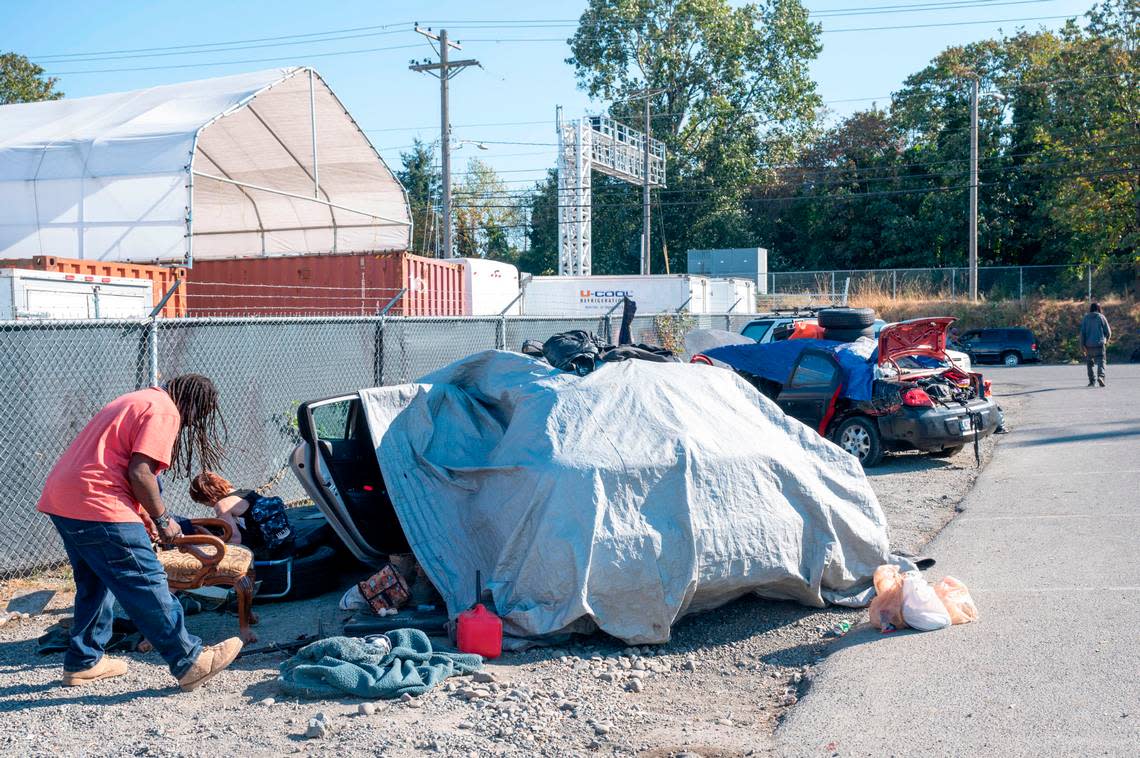Tacoma council passes a homeless camping ban. Here’s what it means and when it starts
An ordinance to create a homeless encampment ban around temporary shelters and protected waters in Tacoma was passed by the City Council on a 6-3 vote Tuesday night.
The ordinance restricts homeless camps from being set up within 10 blocks of the city’s temporary homeless shelters.
The implementation and enforcement of the ordinance will be determined by Neighborhood and Community Services and Tacoma Police Department, ahead of the Nov. 14 effective date.
Encampments now would be banned near Aspen Court, Tacoma Emergency Micro-Shelter Sites at 6th Avenue and Orchard Street, South 69th Street and Proctor Street, 60th Street and McKinley Avenue; the stability site at 1421 Puyallup Ave.; the mitigation sites at South 82nd Street and Pacific Avenue and 3561 Pacific Avenue, the RISE Center Emergency Stabilization Shelter, Altheimer Memorial Church of God in Christ, Bethlehem Baptist Church and Shiloh Baptist Church.
The ordinance also restricts encampments alongside rivers, waterways, creeks, streams and the shorelines of Puget Sound.
The ordinance was brought forward by council member John Hines, District 1, and was co-sponsored by council members Sarah Rumbaugh, District 2, and Joe Bushnell, District 5. It was also supported by Mayor Victoria Woodards and at-large council members Kristina Walker and Olgy Diaz.
“Encampments are not a safe and healthy place for anyone because they present such a health-and-safety issue,” Hines said. “This policy is meant to address encampments and encampments that are propped up around places where we’re serving the most vulnerable in our community, people who are trying to get off the streets and move on with their lives, people who have accepted services, people who have accepted the rules and expectations that are necessary for them to move on.”
Some people in the council chamber erupted in yells of “Shame!” after the ordinance passed.
The ordinance will go into effect Nov. 14 to coordinate with the opening of a low barrier site at 35th and Pacific Avenue.
Woodards said she could support the ordinance because the city has a diversity of shelter options with the emergency mitigation site opening next month.
“I’m not voting for this so that we can criminalize homelessness,” she said. “I’m voting for this so that we can get people to accept the services that we offer.”
Violations of the ordinance carry a maximum fine of $250 and/or a maximum imprisonment of 30 days.
Deputy Mayor Catherine Ushka was one of the first council members to say she would not support the ordinance.
“I can’t pass something that makes an economic challenge a criminal offense,” she said.

Council member Keith Blocker, District 3, said the ordinance is off the mark and could cause more harm than good by causing trauma to those in encampments by moving them around. He said he sponsored an encampment ban ordinance last year but later decided he could no longer support it because he couldn’t see how it would help the most vulnerable people in the community.
“Here we are now with another ordinance that I don’t think is the solution,” he said.
Walker said she would not have been able to support the ordinance a year ago, but the city now has a fully staffed Homeless Engagement Alternatives Liaison team, 200 new shelter beds, with 85 more beds to come, a low-barrier site and an upcoming safe parking site. She also said Pierce County now has a plan to end homelessness.
Hines said the city has made investments in housing and homelessness by setting up multiple temporary sites and passing a one-tenth of 1 percent sales tax for affordable housing to build more than 600 units of permanent housing, among other things.
“This council has done more and will do more than any previous council to provide shelter and housing for those that are the most vulnerable in our community,” Hines said.
Diaz, the newest member of council, said she did not apply to join the council to criminalize homelessness. She said she was voting in favor of the ordinance to give it a shot and, if it was proven wrong, she would work to change it.
Bushnell said the ordinance is not a solution to end homelessness, but it could be a way to get more shelters in Tacoma.
“If this is the push we need to get more shelter options throughout our entire city and not just concentrated, certain areas, then I’ll vote for this,” Bushnell said.
At-large council member Kiara Daniels voted no, saying she didn’t think the council has listened to or heard the community.
Rumbaugh said she hopes more homeless people will seek the city’s temporary shelter choices and encourages those with vacant private property to let the city lease it for tiny home villages and other types of temporary shelters.
Changes to the original ordinance
Council approved a substitute ordinance, proposed by Woodards, that prohibits camping on public property within 200 feet of protected waters and the Puyallup River, to protect the environment health, to preserve the treaty-protected rights of our Tribal partners and decrease the necessity for dangerous water rescues.
The council also passed an amendment that addressed public parcels that bisect the 10-block radius to include it in the prohibited camping areas.
Woodards and council members Diaz and Walker also proposed an amendment to add evaluation of the ordinance. The amendment, which passed, requires the city manager to provide an update on the progress toward a Mental Health Court and Community Court by the end of April, and an evaluation of the effects of the ordinance before and after implementation with specific data requests by the end of April 2024.
Ushka’s amendment passed, which would require a two-week posting of a sweep, seek voluntary compliance before enforcement and require notification of the Pierce County Coalition to End Homelessness and other non-governmental organizations and mutual aid groups of the removal of the encampment. Ushka said the amendment underlines what the city already does.
